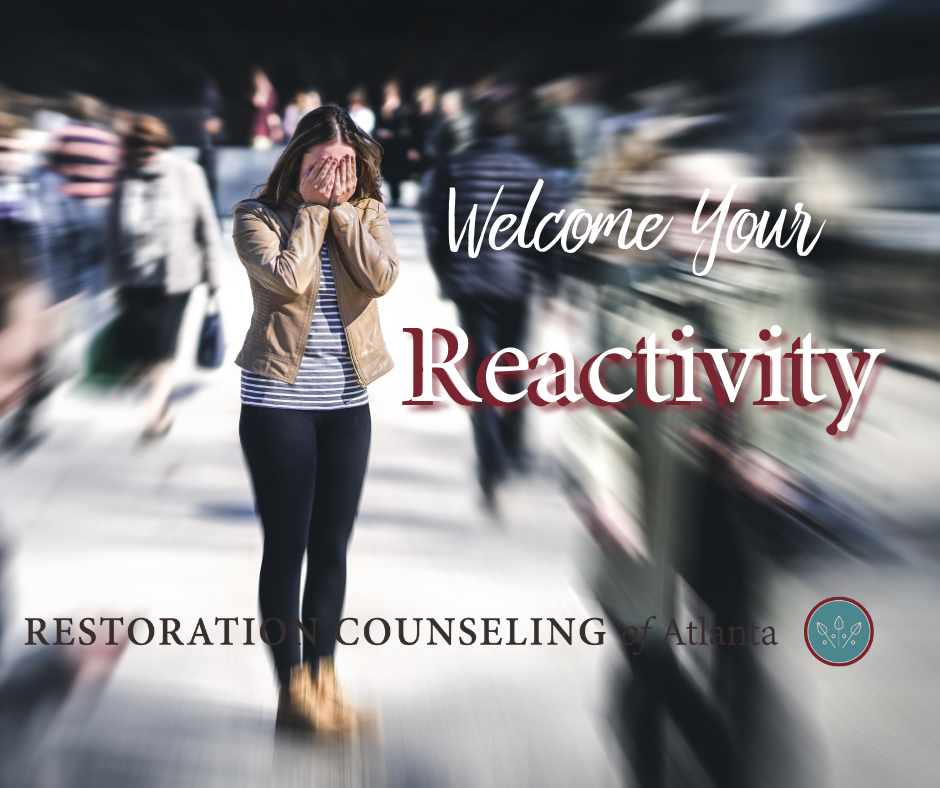Reactivity – where does it come from? It can happen in an instant. Circumstances collide with the wounds in our hearts, and we spiral into a panic. The tendrils of familiar fears invade, and the solid ground we typically stand on begins to crumble beneath us. Our normally rational and reasonable brains begin obsessing over every detail. We try to figure out what went wrong and how to recapture equilibrium.
A disagreement. An awkward conversation. A text message unreturned. The circumstances that unleash the rollercoaster can vary from minuscule facial expressions to the emotional energy behind vacant words to a screaming match with harsh words piercing in rage.
Oftentimes, our thoughts and body are in a duel each lobbying to have the final say in the matter. It can be maddening to know logically there is little to fear and to be experiencing vivid emotions that speak loudly of a different story.
As annoying as these reactions can be, they bring information that, if we let it, can spur us toward wholeness and healing.
Creative Adjustments to Reactivity
Human beings have a built-in drive to survive. We automatically adjust and creatively adapt in ways that best secure our needs as we navigate a broken world with broken human beings – ourselves included. As we come face to face with painful realities permeating our insides and surrounding our outsides, we employ creative adjustments to avoid the elements that threaten to overwhelm us. These strategies twist reality to make it a bit more palatable as the immensity of it all is more than we can tolerate. This reality shifting comes in a spectrum ranging from minimal adjustments to massive adjustments that significantly distort the truth.
These automatic adjustments develop in response to stressors or conflicts in our lives and typically function below our conscious awareness. When challenging experiences hit, we find ways to minimize the impact. We deny the pain. We rationalize away the pain. Or we ignore and repress the pain. We intellectualize and keep the pain distant. Each strategy is brilliantly effective at helping us dodge the pain that assaults us. While effective at avoiding pain, these strategies have an unexpected underbelly that if left unattended results in negative symptoms such as depression, anxiety, and unwanted behaviors.
Divided Existence
As we utilize these strategies, we learn to leave parts of ourselves in the background. We learn to edit, to perform, and to hide. Our bodies are wired to absorb input from the world searching for hints of disapproval, disappointment, and disconnection that would threaten our relational standing. We take stock of these cues and unclear signals, and we declare pieces of us as the culprit and condemn these parts of ourselves to the shadowy corners of our being. Exiled to never again be the cause of relational discord if we can help it. Except, that while these parts of us may be prevented from causing ripples in our relationships, they are also banished to live an existence deprived of connection.
In this cut-off state, aspects of our being stay stuck. The problem with this approach is while these parts are muzzled into an underground existence, they are forced to find alternative ways to bring our attention to their vital role in our lives. These side door entry points usurp our controlled exterior and bring attention through negative symptoms. In spite of their annoying presence, these symptoms are best viewed as a by design feedback loop calling us toward freedom through reintegrating all parts of our being.
The Way Through Reactivity
It can be so confusing to have our heart respond in ways larger than life to even the slightest hint at abandonment, rejection, failure, and criticism. It is understandable to typically take a stance of fighting against these loud reactions. And yet, these reactions are entry points into the rocky terrain of healing if we choose to embark on the journey.
Divorce Meaning
The way through is to pay attention to the meaning that can be infused into challenging realities. We observe our reactivity to the unreturned text and chide ourselves for overreacting or being unreasonable. We notice anger rising up in response to a rude comment and quickly shift to extending the benefit of the doubt because we do not want to be an angry person. Or we notice relief flooding in after setting a boundary and cringe at the appropriateness of that aspect of our experience. Assigning meaning to the aspects of our experience or parts of ourselves we are conflicted about prevents us from being able to tell the full truth. It is important to meet all aspects of our person and experience with grace and compassion rather than utilizing guilt, shame, and self-contempt to keep those realities at bay.
Validate Impact
Once we begin to expand and allow for honesty, we free ourselves up to interact with the impact of situations and scenarios we face in our lives. We can acknowledge being angry at our spouse for their lack of capacity to have hard conversations. Or own that it is difficult to be at a place of low capacity and be unable to give at the level others are used to or need. We can validate that the lack of response to our text can be really scary and the silence can leave us grasping to make sense of the delay. Allowing space for the impact to be acknowledged begins to show tender treatment to the parts of us that historically we tried to invalidate and keep quiet in the corner.
Embrace Needs
In this space of acknowledging impact, we are given an opportunity to pursue healing and growth for the deepest parts of ourselves, but we need external resources to continue the developmental process that was interrupted through disconnection. Human beings are designed to need a secure base and a safe haven. We need a stable, constant place to explore from and a reassuring, comforting place to return to when we get scared or we experience a poor outcome. In those moments, we are looking to receive understanding, acceptance, encouragement, and more before entering back into the fray.
Unfortunately, when we are operating in a divided state, the banished parts of us stay stagnant and underdeveloped due to being cut off from these ingredients necessary for growth. We must drag these experiences into the light of relationship where they can experience the safety and security over time that is needed to change.
Integrate Realities in Reactivity
As we venture on this journey, we will come face to face with realities about ourselves, others, and this world that are difficult. It will require grieving our limitations, embracing our needs, and cultivating the humility, patience, and resilience to slowly grow over time. This process allows us to rest in the fullness of our humanity, and the way forward is coming to terms with all that entails.
Following our reactions might seem counterintuitive, but this pursuit of wholeness provides an opportunity to shift out of the survival tactics initially needed. As adults, we have an expanded capacity for agency as we reclaim these lost parts of ourselves and begin to take ownership of reckoning with reality and our needs within it. This path develops the capacities that equip us to navigate all life throws our way.
Writte n by: Becca Cline, LPC
n by: Becca Cline, LPC
Roswell and Buckhead Locations
becca@restorationcounselingatl.com, ext. 156
Becca has received extensive training with Dr. John Townsend, New York Times best selling author of Boundaries and has completed training in his Competence + Character growth model. She is currently completing the Townsend Leadership Program, which focuses on achieving strategic goals to pursue improved performance personally and professionally.
Becca works with male and female clients who are 13 years or older. She sees couples, families, and individuals. Also, she has worked with clients dealing with a variety of issues including depression, anxiety, addiction, grief/loss, trauma, abuse, spiritual issues, sexuality, family of origin issues, codependency, anger, and interpersonal and relationship issues. In addition, Becca also has experience in running process groups.

